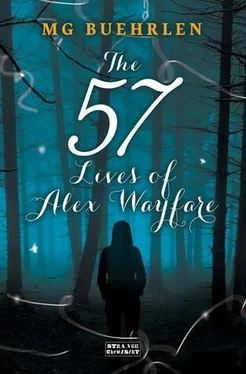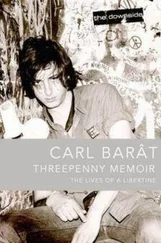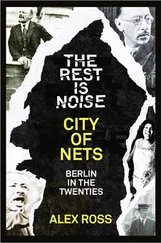A knock on the window in front of my face made me jump. I peered through the glass past my reflection and saw a hefty man in a white apron shooing me from his display window. I guessed I must have looked like a lunatic to his customers inside. I waved at him, mouthed I’m sorry, and started down the sidewalk with no idea where it might lead.
It was a brisk autumn day, the pale blue sky streaked with half-hearted wisps of clouds. A biting breeze cut across the street every now and then, and I was thankful for the warmth of my coat and thick socks. Tall brick shops and apartment buildings stretched on down the road as far as I could see, and the sidewalks were filled with people, some in a hurry, others milling about and chatting with neighbors. The clothing styles made me think my vision was set in the Twenties. Prohibition. The Great Depression. But there was only one way to find out.
I heard the newspaper boy’s voice before I saw him, shouting the latest headlines over the putter of the traffic, the clopping of horses’ hooves pulling wagons, and the murmuring pedestrians. Men in suits and long coats stopped briefly at the boy’s stand to swipe a paper from one of the stacks and push a few coins in his gloved palm. The fluid motion of it all meant it was a daily ritual for them. The newspaper. I wondered what they’d think of its modern day death or the dawn of the Internet.
A thought tugged at the back of my mind, tiny at first. If Dr Farrow was right, and this was all a hallucination, what was stopping me from having a little fun? I decided to do a bit of self-diagnosis.
I leaned over the nearest stack of newspapers, The Daily Herald, and caught the date at the top. Friday, October 21, 1927.
The date was off. It was October, yes, but it wasn’t the twenty-first nor a Friday. And it definitely wasn’t 1927.
If my vision was right, and the twenty-first landed on a Friday in 1927, how would Dr Farrow explain that? I really didn’t think I could retain those kinds of details in my subconscious mind. I couldn’t even remember all the dates I’d spent so much time memorizing for history last year.
The newspaper boy caught me staring and approached, his hand held out. He was tall and thin, with a youngish face, sunken eyes, and a cap set askew on top of greasy hair. I patted my coat pockets for change, but they were empty. Did teenagers really wander the streets without any money in 1927? I didn’t think I’d ever left the house with less than a five dollar bill.
The boy shooed me away the moment he saw I was broke.
But this was my vision. My hallucination. It wasn’t real. It was all in my head. So who said I had to pay for anything?
I slid a newspaper from the top of the stack and started off, tucking it under my arm.
That’s when things got ugly.
“Stop! Thief!” The boy leaped over his newspaper stacks like a pole vaulter. His long, gangly legs landed him at my side in an instant. He seized the paper with both hands, but I mustered my best vise grip. (Having two younger sisters who were always getting into your stuff helped perfect the art.)
“I don’t have to pay,” I said through gritted teeth, my arms tangled in his as we wrestled. He smelled like sauerkraut and woodsmoke.
“Everyone has to pay. It’s two cents or nothing.” His boot came down on mine in an effort to shake me loose.
You wouldn’t think a smashed toe would hurt in a hallucination, but the white-hot, blazing pain was the first clue on my way to learning the inevitable: Dr Farrow was a complete and utter idiot. There’s no way I could’ve dreamed up the detailed agony that was my throbbing toe.
I wasn’t that creative.
The boy yanked the newspaper from under my arm, and I let him do it. I couldn’t care less about the paper now. All I could think about was my toe – my poor, mangled (the nail probably split in two) toe – and the fact that these visions were definitely not hallucinations.
“Is there a problem here?”
I hadn’t realized another boy had approached, or that a crowd had gathered around us for that matter, until he spoke. He looked to be the same age as Newspaper Boy and me, but the serious expression he wore was mature beyond his years. His voice was calm and purposeful. His eyes were a striking blue-green, like the color of Audrey’s glass insulators, his dark hair was cropped short with faint sideburns, and he wore an oversized wool coat with black leather gloves. He was handsome, like those resolute soldiers in old tintype photographs. So handsome, in fact, just looking at him made my ears warm.
I took a step back, feeling stupid for making a scene. Newspaper Boy swept his cap from the ground, which had fallen during our struggle. He ran his fingers through his greasy hair and situated the cap back in place. Then he pointed a bony finger in my direction. “She tried to steal from me. Said she didn’t have to pay.”
The blue-eyed boy turned his attention to me. He scanned me from head to toe, making me feel exposed. “Want to explain that?”
I tugged at my coat, wrapping it tighter around me. “What do you mean?”
He gestured at the crowd, which had begun to move on. “Everyone else has to pay. Why not you?”
I hated where this was going. Not only did I get in trouble in real life, but my visions had to follow suit as well. Why didn’t I ever have visions of sunbathing on the coast of Fiji? Or hiking across the Isle of Skye? Or winning the Nobel Peace Prize?
I had to get out of there. The black needed to come now.
I shrugged both of them off with a wave of my hand and walked away. Maybe if I went back to that spot in the street, the black would close in around me and I’d be back in Mr Draper’s class. I had never moved from the same spot in my previous visions. Maybe walking down the street made the vision last longer this time. Either way, I didn’t want to experiment with the visions anymore. When I got home, I would tell Mom all about them. I’d tell her that she wouldn’t have to worry, though, because once Dr Farrow finished her tests, she’d write me a prescription. Everything would be fine. I’d be normal. Claire wouldn’t have a laughing stock as a sister anymore.
I made it back to the bakery and glanced at my reflection one last time. Some of my hair had fallen from my ribbon during that ridiculous struggle with Newspaper Boy. For the first time in my life, with my hair darker and my face thinner, I actually resembled Mom a little bit.
So different, yet still so very the same.
A strange nostalgic feeling tapped at my shoulder and called my name, but I shrugged it off and turned to step out into the street. Tires squealed and a woman’s scream pierced the air.
Up the road to my right, a black roadster had swerved into oncoming traffic, and it was heading my way. While the other cars in the street careened out of its path, heaving to the side and almost tipping over on their tall, thin wheels, I stood rooted to the sidewalk, unable to move. I couldn’t tear my eyes, or my feet, away.
As the roadster sped closer, two men hefted guns out the side windows and aimed the barrels right at me.
Only one thought crossed my mind.
Now would be a damn good time for this vision to end.
BLUE
Before I had a chance to scream or run, the blue-eyed boy slammed into me, tackling me flat on my back. Wind burst from my lungs and the back of my head smacked the concrete. A blaze of white light flashed behind my closed eyelids, but the sharp, blinding pain was the least of my worries.
A barrage of gunfire rang out, and I stiffened beneath the boy, expecting the bullets to slash through his body and pierce mine. Instead, the windows of the bakery shattered, and a thousand razor-sharp diamonds showered down on top of us. I buried my face in the boy’s neck, and a scream ripped from my throat as shards of glass and brick struck the top of my head and lodged in my tangled hair.
Читать дальше












